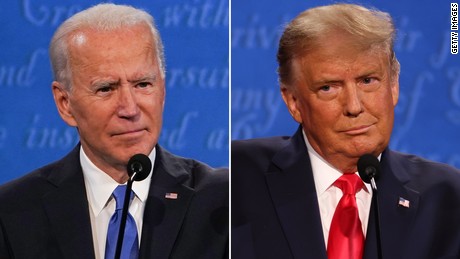The Final Debate

A common quip when discussing the electoral debates this year has been “Nobody won, except the people who didn’t watch.” With increasing cynicism and hopelessness as Election Day approaches, the debates have largely been a display of each candidate’s contrasting personalities, with little discussion of actual policy or plans for a potential future. The second and final presidential debate put some of these issues to bed, but raised more questions and cemented the narratives that each side is pushing.
The debate started out with a divisive announcement: the plexiglass wall between the candidates would be taken down for the debate. This raised questions about President Trump’s contagion levels because of his still recent COVID-19 diagnosis and his opaque current health. The candidates were still twelve feet apart, but the plastic barrier would have added an extra level of security for former VP Biden and proved to the public that the Trump administration is taking the pandemic seriously.
Once the candidates were on stage, the real fight began. Trump started off the night with an uncharacteristically calm demeanor. His new mannerisms, such as talking into the camera, directly addressing the people of America, and using decisive hand gestures, were a clear imitation of his opponent’s rhetoric from past debates. This façade did not last long though, soon Trump was back to degrading his opponent loudly and brashly.
Biden stayed calm during the entire debate, presenting structured plans on COVID, foreign policy, defense, healthcare, and other charged topics. A celebrated moment of his from the debate was finally addressing Trump’s repeated accusations of corruption in his family due to his son, Hunter Biden’s business dealings. He confronted this head-on: stating that his family or Trump’s family was not the problem, but what would happen to the American people’s families was.
Biden’s and Trump’s differences of opinion and policy have widened in the past several weeks leading up to the debate and the election. Healthcare has been an especially touchy subject. Biden supports a public option for healthcare, but would retain a private health insurance sector for those who choose it. Trump called any expansion of Medicare “socialized medicine” and stated his plans to terminate the program entirely.
On racial matters, Biden had a similarly liberal standpoint. He cited a need for police reform and committed to racial justice in society. Biden also talked down crime bills that have been disproportionately harmful to BIPOC. He had formerly supported these bills, but now emphasized a need for rehab over jail, in contrast to these unforgiving laws. Trump compared himself to Lincoln, and said no one but him has done more for Black Americans. He also said that the caged facilities immigrant children are being kept in are “safe and clean”. In addition, Trump insinuated that “murderers” and “rapists” were coming over the Mexican border into America.
On climate change, the candidates were once again opposed. Biden proposed reentry into the Paris Climate Accords, and though he will not initially ban fracking, he committed to a transition to renewable power. Biden relied on an anecdote from his own childhood to prove that those living in frontline communities near power plants and oil refineries often get sicker. He also committed to no more government oil subsidies and openly admitted that climate change is a threat. Trump claimed that “AOC+3”, a group of young House representatives who are also women of color, are conspiring to make the climate plans as damaging to the nation as possible. He also cited Biden as a “window shrinker” who, in order to cut down on domestic heating costs, would install “little bitty windows” in all buildings and apparently give constituents no views of the world outside.
Needless to say, Trump once again seemed baffled and unprepared to find himself onstage, being asked questions about policy. Biden, on the other hand, was composed and self-assured even in the face of Trump’s blustering. Trump refused to commit to a peaceful transition of power, and nothing good can possibly come from that.

